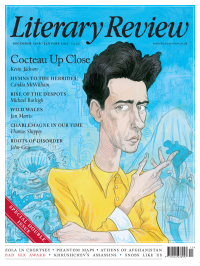Diane Purkiss
Out of the Ashes
The Phoenix: An Unnatural Biography of a Mythical Beast
By Joseph Nigg
University of Chicago Press 487pp £24.50
Most of us understand the phoenix, the self-breeding, self-resurrecting bird that burns itself alive. It was a byword for longevity in Hesiod’s time and a symbol of uniqueness in Martial’s. He wrote that, compared to one lovely girl, the bird is commonplace. Herodotus told of a red-gold bird that flies from Arabia to Heliopolis every five hundred years to bury its myrrh-covered parent in a temple. It took five hundred more years for Ovid to add to the tale. His bird makes a nest of spices in a palm tree, and from its body rises a new bird, which then carries its parent to the temple to be buried. This was the phoenix of Philip Sidney and of Shakespeare. By the time in which they lived, it was embedded in Christian ideas of sacrifice and rebirth. In the first century, Pope Clement I saw the phoenix tale as proof of Christ’s resurrection; it was Christians who added the detail of the bird’s self-immolation, and its rebirth after three days, exactly the time taken by Christ.
What more is there to say? A surprising amount. Joseph Nigg ransacks obscure texts – ancient, medieval and modern – to discover the phoenix’s strange, exotic, compelling identity. We visit the benu bird of Egypt, which may have inspired Herodotus; we learn about the fenghuang, the royal bird of

Sign Up to our newsletter
Receive free articles, highlights from the archive, news, details of prizes, and much more.@Lit_Review
Follow Literary Review on Twitter
Twitter Feed
Russia’s recent efforts to destabilise the Baltic states have increased enthusiasm for the EU in these places. With Euroscepticism growing in countries like France and Germany, @owenmatth wonders whether Europe’s salvation will come from its periphery.
Owen Matthews - Sea of Troubles
Owen Matthews: Sea of Troubles - Baltic: The Future of Europe by Oliver Moody
literaryreview.co.uk
Many laptop workers will find Vincenzo Latronico’s PERFECTION sends shivers of uncomfortable recognition down their spine. I wrote about why for @Lit_Review
https://literaryreview.co.uk/hashtag-living
An insightful review by @DanielB89913888 of In Covid’s Wake (Macedo & Lee, @PrincetonUPress).
Paraphrasing: left-leaning authors critique the Covid response using right-wing arguments. A fascinating read.
via @Lit_Review